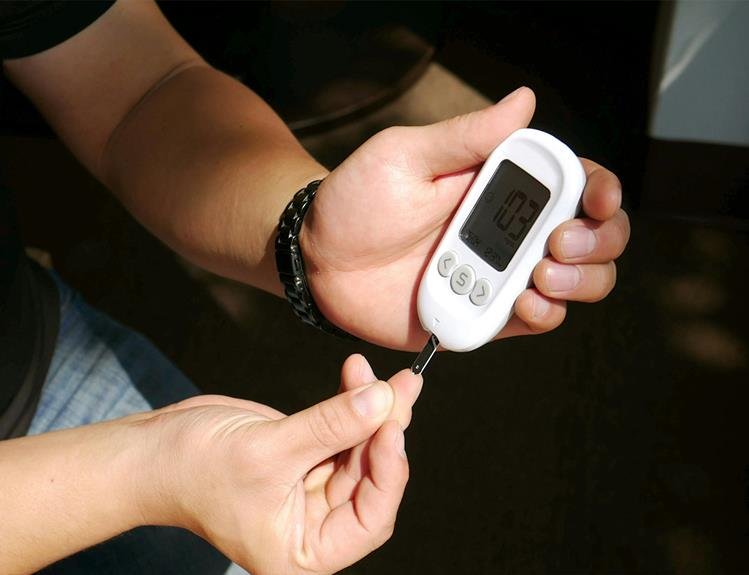The Role of Early Detection in Preventing Diabetes-Related Amputations
You may think that losing a limb to diabetes sounds like a plot twist in a science fiction movie, but the reality is far more stark.
Imagine if there was a way to intercept this dire outcome before it even crossed your mind. The key lies in a realm where foresight and knowledge converge to alter destinies.
Stay with us to uncover the pivotal role early detection plays in the intricate web of preventing diabetes-related amputations.
Understanding Diabetes Complications
To grasp the severity of diabetes complications, consider the impact they can have on your daily life. Diabetes can lead to a range of complications that affect various parts of your body. High blood sugar levels over time can damage blood vessels and nerves, leading to issues such as neuropathy, where you may experience numbness, tingling, or pain in your hands and feet. This can make simple tasks like walking or picking up objects challenging.
Diabetes also increases the risk of heart diseases, stroke, kidney problems, and vision issues. Managing your blood sugar levels through medication, diet, and exercise is crucial in preventing or delaying these complications. Ignoring the signs and symptoms of diabetes or not following your treatment plan can worsen these complications, impacting your quality of life significantly.
Stay informed, monitor your health closely, and seek medical advice promptly to address any concerns and minimize the risks associated with diabetes complications.
Importance of Timely Screening
How can early detection through timely screening help prevent diabetes-related amputations?
Timely screening plays a crucial role in identifying diabetes-related complications early on, such as peripheral neuropathy and peripheral artery disease. By detecting these issues in their initial stages, healthcare providers can intervene promptly to manage the condition effectively, thus reducing the risk of amputations.
Regular screenings for foot health, nerve function, and blood flow help in monitoring any changes that could indicate potential problems. Individuals with diabetes should undergo these screenings at recommended intervals to ensure any concerns are addressed promptly.
Through early detection, healthcare professionals can implement lifestyle modifications, medication adjustments, or other interventions to prevent the progression of complications that may lead to amputations. Therefore, timely screening is vital for individuals with diabetes to maintain optimal foot health and prevent the devastating consequences of advanced complications.
Early Signs and Symptoms
Detecting early signs and symptoms of diabetes-related complications is crucial for preventing potential amputations. One of the key indicators of diabetes-related foot issues is neuropathy, where you may experience tingling, burning, or numbness in your feet. Pay attention to any changes in your foot's temperature, color, or texture, as these could signal poor circulation or nerve damage.
Persistent foot ulcers that are slow to heal, especially on the soles of your feet, can also be a warning sign of diabetes-related complications. If you notice redness, swelling, or warmth in your feet, it could be a sign of infection that needs immediate attention. Additionally, sudden changes in foot shape or the development of hammertoes may indicate nerve or muscle damage.
Be vigilant about any foot deformities or changes and consult a healthcare professional promptly if you observe any of these symptoms. Early detection and intervention can significantly reduce the risk of diabetes-related amputations.
Diagnostic Tests for Detection
Regularly undergoing diagnostic tests can aid in the early detection of potential diabetes-related complications that could lead to amputations. These tests play a crucial role in monitoring your blood glucose levels, identifying any fluctuations, and assessing your overall diabetes management.
One of the primary diagnostic tests for diabetes-related complications is the A1C test. This test provides an average of your blood sugar levels over the past 2-3 months, giving valuable insights into your long-term glucose control. Additionally, regular blood tests to check your fasting and postprandial glucose levels help in understanding how your body processes sugar throughout the day.
Another essential diagnostic test is a comprehensive foot exam. This exam involves checking for any signs of nerve damage, poor circulation, or foot ulcers that could lead to serious complications if left untreated. By detecting these issues early, you can take proactive steps to prevent them from progressing and potentially leading to amputations.
Regular screening through these diagnostic tests is key to maintaining optimal diabetes management and reducing the risk of severe complications.
Role of Healthcare Providers
As a healthcare provider, your role is crucial in preventing diabetes-related amputations. Educating yourself on diabetes and its complications, conducting timely screenings for at-risk patients, and collaborating with multidisciplinary teams to create effective treatment plans are key responsibilities.
Your proactive approach can significantly impact early detection and intervention, ultimately reducing the risk of amputations in diabetic patients.
Provider Education on Diabetes
Healthcare providers play a crucial role in educating patients about diabetes management to prevent complications like amputations. By providing clear and tailored guidance, healthcare professionals can empower individuals with diabetes to make informed decisions about their health.
They educate patients on the importance of maintaining stable blood sugar levels through medication adherence, healthy eating, and regular exercise. Additionally, healthcare providers emphasize the significance of monitoring for any signs of infection or injury, especially in the feet, which are common sites for diabetes-related complications.
Through ongoing education and support, healthcare providers help patients understand the impact of diabetes on their overall well-being and the steps they can take to reduce the risk of serious complications, such as amputations.
Timely Screenings for Patients
To ensure optimal care for individuals with diabetes and prevent complications like amputations, healthcare providers must prioritize conducting timely screenings for early detection of potential issues. Regular screenings for blood sugar levels, foot health, eye health, kidney function, and blood pressure are crucial in identifying problems early on.
Screening for peripheral neuropathy, a common diabetes complication, can help prevent foot ulcers and amputations. By staying proactive and conducting these screenings at recommended intervals, providers can intervene promptly if any issues arise.
Early detection allows for timely adjustments in treatment plans, leading to better management of diabetes and reduced risk of severe complications. Encouraging patients to attend these screenings regularly and educating them on the importance of proactive healthcare can significantly impact their overall well-being.
Collaboration for Treatment Plans
How can healthcare providers collaborate effectively on treatment plans for individuals with diabetes to ensure comprehensive care and prevention of complications like amputations?
By working together, providers can combine their expertise to create personalized treatment strategies. Endocrinologists can manage medication regimens, while podiatrists focus on foot care and potential ulcer prevention. Dietitians can offer nutritional guidance to control blood sugar levels, and mental health professionals can address the emotional aspects of living with diabetes.
Regular communication and shared electronic health records help ensure that all providers are informed and working towards the same goal of holistic diabetes management. This collaborative approach maximizes the effectiveness of treatment plans, leading to better outcomes and reducing the risk of diabetes-related amputations.
Treatment Strategies for Prevention
Implementing a combination of lifestyle changes and medication regimens is crucial in effectively preventing diabetes-related amputations. Maintaining a healthy weight through proper diet and regular exercise can help control blood sugar levels and reduce the risk of complications. It's essential to monitor blood glucose levels consistently and adhere to prescribed medications to manage diabetes effectively. Additionally, quitting smoking and limiting alcohol intake can significantly improve overall health and reduce the likelihood of amputations.
In cases where lifestyle modifications aren't sufficient, healthcare providers may recommend medications such as insulin or oral hypoglycemic agents to help regulate blood sugar levels. Regular medical check-ups and foot examinations are also vital in detecting any potential issues early on and preventing them from escalating. Wound care and proper foot hygiene are essential in preventing infections that could lead to amputations. By proactively managing diabetes through a combination of lifestyle changes and medication adherence, individuals can significantly reduce the risk of diabetes-related amputations.
Patient Education on Risk Factors
You must understand the importance of being aware of risk factors associated with diabetes to prevent complications.
Lifestyle modifications like maintaining a healthy diet and regular exercise play a crucial role in managing these risk factors.
Risk Factor Awareness
Patients should regularly be educated on the risk factors associated with diabetes to increase awareness and promote early detection. Understanding these risk factors, such as obesity, family history, high blood pressure, and high cholesterol levels, allows individuals to take proactive steps in managing their health.
By being aware of these factors, individuals can work closely with healthcare providers to monitor their health and make necessary lifestyle changes to prevent complications like amputations. Regular screenings and check-ups can help catch any potential issues early on, leading to better outcomes and quality of life.
Empowering patients with knowledge about diabetes-related risk factors enables them to make informed decisions about their health and well-being, ultimately reducing the likelihood of severe complications.
Lifestyle Modification Importance
Emphasizing the importance of lifestyle modifications is crucial in educating individuals about the risk factors associated with diabetes. By making healthy choices, such as maintaining a balanced diet, engaging in regular physical activity, and managing stress levels, you can significantly reduce your risk of developing diabetes-related complications like amputations.
Understanding how lifestyle factors, such as smoking, excessive alcohol consumption, and poor diet, can contribute to the progression of diabetes is essential for taking proactive steps towards prevention. Educating yourself about the impact of these habits on your overall health and well-being empowers you to make informed decisions that support long-term wellness.
Long-Term Management Approaches
Effective long-term management approaches play a crucial role in preventing diabetes-related complications such as amputations. Consistent monitoring of blood sugar levels, maintaining a healthy diet, engaging in regular physical activity, and adhering to medication regimens are key components of successful long-term diabetes management. By keeping your blood sugar levels within the target range recommended by your healthcare provider, you can significantly reduce the risk of nerve damage, poor circulation, and other issues that can lead to amputations.
Regular check-ups with your healthcare team are essential for evaluating your diabetes management plan and making any necessary adjustments. These appointments allow for the early detection of potential problems, providing an opportunity to address issues before they escalate. Additionally, staying informed about new developments in diabetes care and treatment options can empower you to make informed decisions about your health.
Frequently Asked Questions
Can Diabetes-Related Amputations Be Completely Prevented With Early Detection and Timely Intervention?
You can significantly reduce the risk of diabetes-related amputations with early detection and prompt intervention. While complete prevention may not always be possible, proactive management and care can greatly improve outcomes and quality of life.
Are There Any Specific Lifestyle Changes or Interventions That Can Reduce the Risk of Amputations in Diabetic Patients?
Making lifestyle changes like controlling blood sugar levels, maintaining a healthy weight, and regular exercise can significantly reduce the risk of amputations in diabetic patients. Timely interventions and proper foot care are crucial.
How Often Should Individuals With Diabetes Undergo Screening for Early Detection of Complications?
For individuals with diabetes, regular screening is crucial. Your healthcare provider will recommend how often you should undergo screenings to detect complications early. Following these recommendations can help prevent serious issues down the line.
Are There Any Advancements in Technology or Medical Treatments That Have Improved the Outcomes of Diabetic Patients at Risk of Amputations?
Advancements in technology and treatments have significantly improved outcomes for diabetic patients at risk of amputations. New methods and devices allow for earlier detection and intervention, enhancing overall care and reducing the likelihood of amputation.
What Resources or Support Systems Are Available for Diabetic Patients Who Have Already Undergone Amputations or Are at Risk of Amputations?
If you've had an amputation or are at risk, seek support from diabetes specialists, prosthetic experts, and mental health professionals. Resources like support groups, counseling, and advanced prosthetics can improve your quality of life.
Conclusion
In conclusion, early detection plays a crucial role in preventing diabetes-related amputations. By getting screened regularly and recognizing the signs and symptoms early on, individuals can take proactive steps to manage their condition and reduce the risk of complications.
While some may argue that screenings can be costly, the long-term savings and improved quality of life far outweigh the initial investment.
Stay informed, stay proactive, and prioritize your health to prevent diabetes-related amputations.



